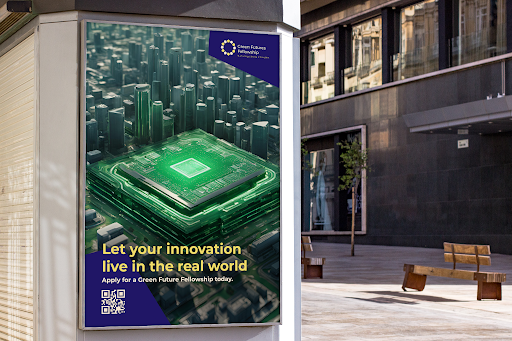Shape History, a social impact communications agency, today launched its groundbreaking campaign for the Royal Academy of Engineering’s inaugural Green Future Fellowships (GFF) programme. This new industry-first initiative aims to provide critical funding to leading researchers and innovators developing breakthrough climate solutions that can be scaled up to tackle the climate crisis. The GFF programme focuses on supporting practical technologies and innovative approaches that have the potential to significantly contribute to achieving net zero emissions.
Shape History was tasked with developing a brand identity and digital marketing strategy for the programme, positioning it as a driving force for innovative climate solutions. The agency’s approach centres on a newly crafted brand identity that builds upon the Royal Academy of Engineering’s established reputation while showcasing the GFF programme’s pivotal role in spearheading climate innovation.
At the heart of the campaign is a powerful ‘hero video’ highlighting the GFF’s potential to drive transformative climate solutions. This is complemented by tailored content for social media and events, designed to engage a diverse audience ranging from early-career researchers to established innovators. Leveraging cutting-edge behavioural science and data analytics, Shape History has created a campaign that not only informs but inspires action. The goal is to attract a diverse pool of applicants who can bring fresh perspectives to the climate challenge, ultimately accelerating the development of groundbreaking solutions.
To maximise reach and impact across various platforms, Shape History has implemented a targeted paid strategy, utilising sophisticated audience mapping and segmentation techniques. This multi-faceted approach aims to inspire and engage potential applicants, driving home the transformative potential of the Green Future Fellowships in addressing critical climate challenges.
For the campaign, they took inspiration from nature, focusing on the delicate process of growth and transformation. Like a seed that needs the right conditions to become a tree, breakthrough ideas that could drive us through to net zero are often hindered by rigid funding and a lack of support. The concept therefore sought to prioritise nurturing solutions that have the opportunity to take root in the real world.
Leila Hashemi, Strategy Lead at Shape History, said: “Breakthrough ideas still need extensive support to grow into world-changing impacts, and the Green Future Fellowships programme is designed to provide that crucial backing. It’s been a pleasure collaborating with the Royal Academy of Engineering to create a bold brand identity that captures the urgency and innovation driving climate action. Our visual language is designed to inspire both the scientific community and the general public, paving the way for the transformative impact of the Green Future Fellowships on our planet’s future.”
The Green Future Fellowships, backed by a £150 million government endowment, will provide up to £3 million per fellowship to researchers and innovators developing practical, breakthrough technologies to combat climate change.
The campaign will run between 10th September and 5th November, with Shape History providing ongoing optimisation and reporting to ensure maximum impact and engagement.

To learn more about the Green Future Fellowships, visit the Royal Academy of Engineering’s GFF page.
Source: Shape History




You must be logged in to post a comment Login